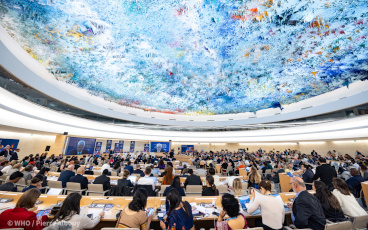Angola steps up immunization drive in its efforts to eradicate polio
Vice President Fernando da Piedade Dias dos Santos launched the first of three rounds of a national polio immunization campaign planned for 2011.
SAURIMO, Angola, 25 March 2011 – It’s not every day that your child gets vaccinated by your country’s vice president. That was the fate of Isabel Zita Motinha this morning.
She had brought her child, Edson, to be immunized at Kakolo municipal hospital, and has just been told Vice President of the Republic of Angola Fernando da Piedade Dias dos Santos would administer the vaccine.
“Today is very a happy day for me and my child,” said Ms. Motinha. “I will meet the vice president and he will give to my baby two drops of polio vaccine.”
During his official visit to the eastern province of Lunda Sul, Vice President Fernando da Piedade Dias dos Santos launched the first of three rounds of a national polio immunization campaign planned for 2011. The aim is to vaccinate all children under the age of five against polio, to lower transmission rates in the country.
In 2010, Angola registered 33 new polio cases, with the eastern provinces of Lunda Sul and Lunda Norte accounting for more than 30 per cent of them.
Indices of rejection were particularly high in these provinces. Now, thanks to strengthened partnerships with traditional leaders and healers, as well as with local churches, the last sub-national immunization round held last month has already led to a coverage rate of 96 per cent in the area, up from 69 per cent last August. More













